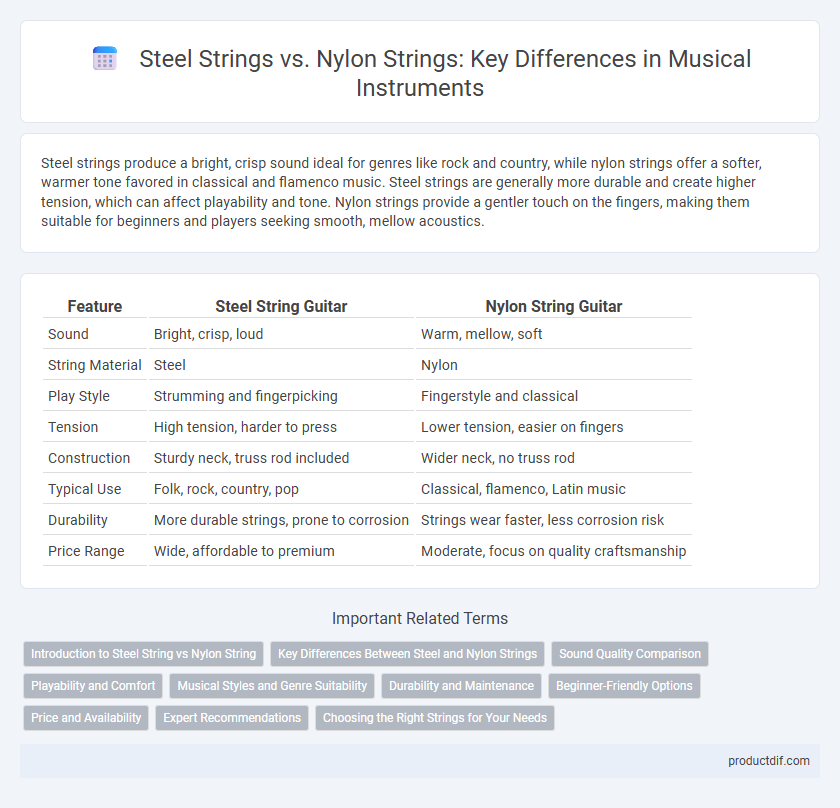Steel strings produce a bright, crisp sound ideal for genres like rock and country, while nylon strings offer a softer, warmer tone favored in classical and flamenco music. Steel strings are generally more durable and create higher tension, which can affect playability and tone. Nylon strings provide a gentler touch on the fingers, making them suitable for beginners and players seeking smooth, mellow acoustics.
Table of Comparison
| Feature | Steel String Guitar | Nylon String Guitar |
|---|---|---|
| Sound | Bright, crisp, loud | Warm, mellow, soft |
| String Material | Steel | Nylon |
| Play Style | Strumming and fingerpicking | Fingerstyle and classical |
| Tension | High tension, harder to press | Lower tension, easier on fingers |
| Construction | Sturdy neck, truss rod included | Wider neck, no truss rod |
| Typical Use | Folk, rock, country, pop | Classical, flamenco, Latin music |
| Durability | More durable strings, prone to corrosion | Strings wear faster, less corrosion risk |
| Price Range | Wide, affordable to premium | Moderate, focus on quality craftsmanship |
Introduction to Steel String vs Nylon String
Steel string guitars produce a brighter, louder sound ideal for genres like folk, rock, and country, while nylon string guitars offer a warmer, mellower tone favored in classical and flamenco music. Steel strings typically have higher tension, providing greater projection and sustain, whereas nylon strings are softer and easier on the fingers, making them suitable for beginners. Choosing between steel and nylon strings depends on the desired sound, playing style, and musical genre preferences.
Key Differences Between Steel and Nylon Strings
Steel strings produce a brighter, louder sound with higher tension, making them ideal for genres like rock and country, while nylon strings offer a softer, warmer tone favored in classical and flamenco music. The steel strings' durability supports aggressive playing styles but can be harsh on fingers, whereas nylon strings are gentler, providing greater comfort for beginners and fingerstyle techniques. Differences in string material and tension significantly influence playability, sound projection, and overall musical expression on acoustic guitars.
Sound Quality Comparison
Steel strings produce a bright, crisp, and loud tone favored in genres like rock, pop, and bluegrass, offering strong projection and sustain. Nylon strings deliver a warm, mellow, and softer sound ideal for classical, flamenco, and folk music, with lower tension that enhances playability and expressiveness. The choice between steel and nylon strings significantly affects tonal clarity, dynamic range, and overall sound quality of an acoustic guitar.
Playability and Comfort
Steel string guitars offer brighter tones and higher tension, making them ideal for aggressive strumming but potentially causing more finger fatigue. Nylon string guitars provide softer, more flexible strings that are easier on the fingertips, enhancing comfort during extended play sessions. Players seeking smooth playability and reduced finger strain often prefer nylon strings, especially beginners or those focusing on fingerstyle techniques.
Musical Styles and Genre Suitability
Steel string guitars excel in genres like rock, country, and blues due to their bright, crisp tone and strong projection suited for strumming and flatpicking. Nylon string guitars are favored in classical, flamenco, and Latin music for their mellow, warm sound and softer attack, ideal for fingerpicking and intricate playing. The choice between steel and nylon strings significantly influences the guitar's tonal character and playability within specific musical styles.
Durability and Maintenance
Steel strings offer greater durability due to their resistance to wear and environmental factors, making them ideal for frequent players and outdoor performances. Nylon strings require more delicate handling and frequent replacement, as they are prone to stretching and damage from humidity and temperature changes. Proper maintenance for steel strings involves regular cleaning to prevent corrosion, while nylon strings benefit from controlled storage conditions to extend their lifespan.
Beginner-Friendly Options
Steel string guitars offer bright, clear tones ideal for rock and folk styles, but their higher tension may challenge beginners with finger strength. Nylon string guitars provide softer, warmer sounds favored in classical and flamenco music, featuring lower string tension that eases finger discomfort for new players. Selecting a nylon string guitar often promotes faster learning due to its gentle touch and forgiving playability.
Price and Availability
Steel string guitars generally have a higher price range due to the durability and bright tone of the strings, making them a popular choice among intermediate to professional players. Nylon string guitars are often more affordable and widely available in beginner models, appealing to new learners and classical players seeking softer sound and ease of play. Both string types are readily available in music stores and online, with steel strings commonly stocked for acoustic and electric guitars, while nylon strings are standard for classical and flamenco guitars.
Expert Recommendations
Expert recommendations for musical instruments emphasize steel strings for genres requiring bright, articulate tones and strong projection, such as folk, rock, and country. Nylon strings are preferred by classical and flamenco guitarists for their warm, mellow sound and softer playing experience, which reduces finger fatigue during intricate fingerstyle techniques. Professionals highlight the importance of choosing strings based on tonal qualities and playing style compatibility to achieve optimal performance and sound clarity.
Choosing the Right Strings for Your Needs
Choosing between steel strings and nylon strings depends largely on your musical style and instrument type. Steel strings offer brighter tones and greater tension, making them ideal for genres like rock, country, and folk, while nylon strings provide softer, warmer sounds suited for classical, flamenco, and jazz music. Consider string tension, tone quality, and playability to match your guitar's construction and your personal preference for optimal sound and comfort.
Steel String vs Nylon String Infographic

 productdif.com
productdif.com